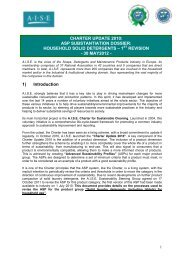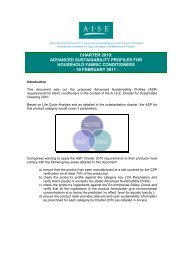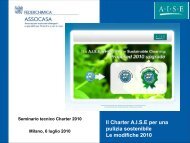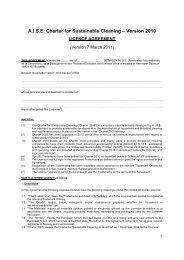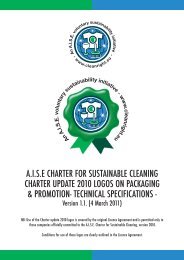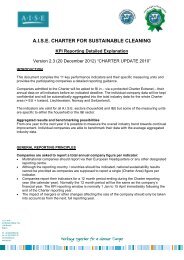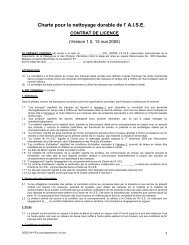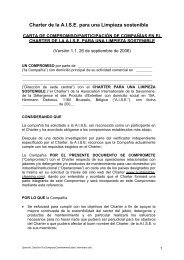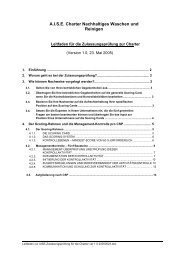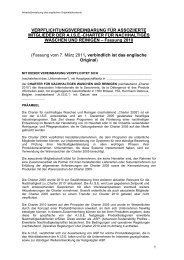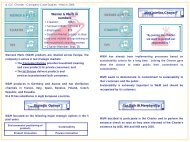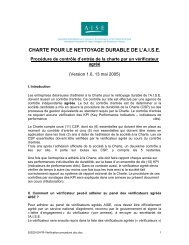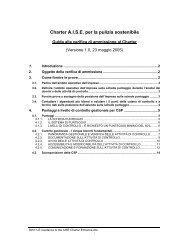ASP Substantiation Dossier - Sustainable Cleaning
ASP Substantiation Dossier - Sustainable Cleaning
ASP Substantiation Dossier - Sustainable Cleaning
You also want an ePaper? Increase the reach of your titles
YUMPU automatically turns print PDFs into web optimized ePapers that Google loves.
Commission to the point that it has been explicitly addressed in the SCP/SIP Action Plan/Review of<br />
Ecodesign Directive 3 .<br />
This document provides details on the processes used to develop the Advanced Sustainability<br />
Profile for the product group “Liquid Laundry Detergents for Household Use”.<br />
2) The market (EU, plus Norway and Switzerland)<br />
Fabric washing:<br />
=> 49% of A.I.S.E. total household market value<br />
=> Market Value: 14.24 billion Euros in 2008<br />
Estimated proportion for the value of Liquid<br />
Detergents: about 28% i.e. about 4 billion Euros<br />
Source: A.I.S.E. 2008 Annual review<br />
3) <strong>ASP</strong> principles<br />
The principles applied to the setting of the <strong>ASP</strong> criteria are as follows:<br />
1. The <strong>ASP</strong> criteria should represent a target that is aspirational, but reasonably achievable<br />
by all. Our vision is that the product within the category should be able to achieve the <strong>ASP</strong><br />
targets within a reasonable timeframe without the need for significant new product innovation<br />
or process intervention.<br />
2. The <strong>ASP</strong> criteria will reflect as completely as possible the key drivers of reduced<br />
environmental impact, as determined by Life Cycle Analysis.<br />
3. The Advanced Sustainability Profile, like the Charter, is a living system, with the implicit<br />
intention to periodically increase the targets in order to move the category in the direction of<br />
continuous sustainable improvement.<br />
4. The setting of <strong>ASP</strong> criteria must always follow the established evaluation and consultation<br />
process detailed in the next section.<br />
3 - “Policy makers have shown an increasing interest in environmental agreements in recent years. The potential of such<br />
agreements between stakeholders – often representative associations of business – to contribute to environmental policy<br />
objectives is widely recognised.”, COM(2002) 412 final: COMMUNICATION FROM THE COMMISSION TO THE EUROPEAN<br />
PARLIAMENT, THE COUNCIL, THE ECONOMIC AND SOCIAL COMMITTEE AND THE COMMITTEE OF THE REGIONS,<br />
Environmental Agreements at Community Level. Within the Framework of the Action Plan on the Simplification and<br />
Improvement of the Regulatory Environment, Brussels, 17.July 2002.<br />
- “Self-regulation, including voluntary agreements offered as unilateral commitments by industry, can provide for quick<br />
progress due to rapid and cost-effective implementation, and allows for flexible and appropriate adaptation to technological<br />
options and market sensitivities”, Proposal for a DIRECTIVE OF THE EUROPEAN PARLIAMENT AND OF THE COUNCIL<br />
establishing a framework for the setting of ecodesign requirements for energy related products COM (2008) 399<br />
2



